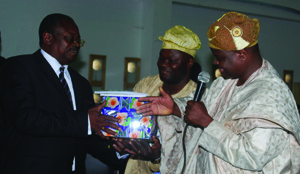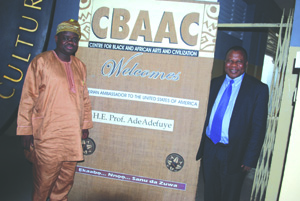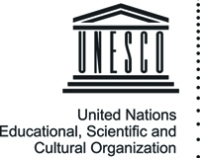
•Executive Director, the Observatory of Cultural Policies in Africa, Maputo, Mozambique, Prof. Lupwishi Mbuyamba, (l) receiving a gift from Director General of the Centre for Black and African Arts and Civilization (CBAAC), Prof Tunde Babawale after presentation of the former’s lead paper at the Annual Black History Month Festival’s Public Lecture, which held at the Trenchard Hall of the University of Ibadan, Ibadan, last Thursday, February 24
Executive Director of the Maputo, Mozambique-based agency, the Observatory for Cultural Policies in Africa (OCPA), Prof. Lupwishi Mbuyamba has said the only panacea to stemming the rise in the horde of Africans rushing to the Western worlds in purported search for the greener pastures remained for African leaders to ensure an even spread of the continent’s wealth and resources.
He also posited that the same solution applied for the menace of corruption as he maintained that only accountability and good governance could guarantee that Africans stopped flocking to the Western worlds in what many have termed ‘neo slavery.’
Prof Mbuyamba spoke as guest lecturer at the Public Lecture organized to open this year’s edition of the Black History Month (BHM) by the Centre for Black and African Arts and Civilization (CBAAC), at the Trenchard Hall, University of Ibadan, Ibadan, the Oyo State capital, Thursday.
The public lecture preceded a public exhibition at the Institute of African Studies, at the same university, lined up as part of a week-long programme to mark the BHM, commemorated globally to celebrate the Black civilization.
Mbuyamba’s paper which was platformed on the theme of this year’s celebrations of : “African Diaspora, African Unity and African Development,” sought to provide an insight into the major contributions made by Africans in the Diaspora to the development of the mother continent, Africa.
“Today, Africans die in boats ferrying them to Europe or America just as obtained in the days of the Slavery, but the only difference being that the latter journey is voluntary. Tunisians risk their lives to get Italy and other parts of Europe as other Africans go through the rigours of the Visa lottery embarrassments just in an attempt to get a better life.
“In the same vein also the youth in the rural areas or villages surge to the cities to seek better lives. Now if you provide electricity for them to do the things that those in the cities do, what would they be looking for in the cities? By extension, if you talk about corruption in Africa as factors militating against the African renaissance, then I would say that if good governance is demanded as standard, the problem of corruption would be a thing of the past, considering that both emigrations and corruption are problems affecting the emergence of the ideal Africanism,” said Mbuyamba.
As a challenge to the continent’s peoples’ integration, therefore, the guest lecturer called for the re-evaluation of the impact of the African Diaspora in order to strengthen the link between them and Africa..
“ The impact of the African Diaspora needs evaluation in both sense, the benefit and improvement of the well being of the populations in the continent in one side and the influences, the acculturation of the African values of civilization facing a new environment and the changes the globalization phenomenon will inevitably bring to African culture in other side. There is then a need to strengthen the links between the Diaspora and the Mother Africa and help build bridges through a well organized tourism system .By establishing networks and organizing forums and celebrations, the moral link is preserved and essential brotherhood values maintained. By associating the African Diaspora to the planning and offering facilities, conditions are created for investment and their participation in building a better environment to develop the continent. Somehow from within.”
According to him, the development of Africa is the final goal of all strategies to put in place just as he called for several levels of responsibilities to be considered including the elite and leaders of the communities, intellectuals, decision makers.
By raising the elite’s consciousness and tasking the leadership, Mbuyamba stressed the need to adopt what he termed the ‘Seven pillars that constitute the frame of the New Chart for African Cultural Renaissance,’ which he said included among others: Access to culture for all including minorities groups in the country and marginalized people; Equal involvement for all categories of the population, in particular youth (to be attentive at the young people expectations) and women(especially in the areas of their particular interest and capacity),traditional leaders, church leaders, and others.
Respect of democracy and liberties for all creators, consumers, their expression, their associations, their productions, support to creativity; Preservation of the memory of the history of peoples, their heritage and legacy, transmission to young generations, participation in the renaissance campaign by promoting and developing cultural instruments: sciences, technologies, know how, languages; Integration of the cultural dimension in development process including in the definition of strategies and the implementation of the Millennium Development Goals and involvement of the creative economy strategy in the planning projects;
Contribution to the African Integration at regional and pan-African levels including the African Diaspora; and Adoption of legitimate Cultural Policies at national level and promotion of the definition and implementation of local cultural policies with an involvement of professional and of the civil society representatives, conclude the list.
“The final objective beyond the campaign for African Cultural Renaissance is to identify and build reference centres of excellence expected to generate a new or an updated system of values and draw an ideal of a true African, an ideal for the contemporary times. An African Humanism. To this task contributions and cooperation are expected from all,” he stressed.
Earlier, Director General of CBAAC, Prof Tunde Babawale, in his opening remarks, explained that the choice of the theme for this year’s celebrations was hinged on the United Nations declaration of 2011 as the ‘International Year of the people of African Descent.’
According to Babawale, the UN’s intentions was aimed at promoting and respect for African heritage and culture and to further ensure the participation and integration of people of African descent into the society, hence, CBAAC, as a pan African agency established by Nigeria to preserve, promote and propagate African culture ‘is proud to be associated with that UN’s decision.’
The CBAAC chief who noted that Africa remained a hugely untapped resource by Africans themselves, believed that the continent can tap from her Diaspora links to vast networks that can reposition the continent for greater achievements.
“Africans in the Diaspora given their exposure to Western technologies and education are a vantage position to transfer same growth and the development of the African continent. In the same way also that Africans can help to promote voluntary self-help development projects that can rescue the continent from near collapse of social service. The continent’s Diaspora remains the mirror that reflects the resourcefulness of Africa’s global presence and the beauty in her cultural diversity and ways of life,” said Babawale.
The occasion chaired by Prof Mala Daura, Vice Chancellor of the University of Maiduguri, had in attendance, members of the academia, large contingent of students from the both the host University of Ibadan and the University of Lagos, Akoka, Yaba, Lagos.
From the government Mr. Martins Adaji, Acting Artistic Director of the National Troupe of Nigeria, represented the minister of Tourism and culture, Alhaji Sadiq Mohammed and Mr. George Ufot, Director of Culture at the Ministry who represented the Permanent secretary of the Ministry of Tourism and Culture, Alhaji Gaya Mahe.














